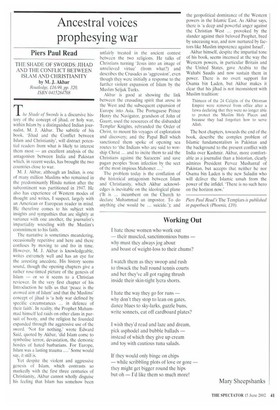Ancestral voices prophesying war
Piers Paul Read
THE SHADE OF SWORDS: JIHAD AND THE CONFLICT BETWEEN ISLAM AND CHRISTIANITY by M. J. Akbar Rout/edge, £16.99, pp. 320, ISBN 0415284708 The Shade of Swords is a discursive history of the concept of jihad, or holy war, within Islam by a distinguished Indian journalist, M. J. Akbar. The subtitle of his book. 'Jihad and the Conflict between Islam and Christianity', will distract potential readers from what is likely to interest them most — an excellent analysis of the antagonism between India and Pakistan which, in recent weeks, has brought the two countries close to war.
M. J. Akbar, although an Indian, is one of many million Muslims who remained in the predominantly Hindu nation after the subcontinent was partitioned in 1947. He also has experience of Western modes of thought and writes, I suspect, largely with an American or European reader in mind. He therefore comes to his subject with insights and sympathies that are slightly at variance with one another, the journalist's impartiality wrestling with the Muslim's commitment to his faith.
The narrative is sometimes meandering, occasionally repetitive and here and there confuses by moving to and fro in time. However. M. J. Akbar is knowledgeable, writes extremely well and has an eye for the arresting anecdote. His history seems sound, though the opening chapters give a rather rose-tinted picture of the genesis of Islam — or so it seems to a Christian reviewer. In the very first chapter of his Introduction he tells us that 'peace is the avowed aim of Islam' and that the Muslims' concept of jihad is 'a holy war defined by specific circumstances ... in defence of their faith'. In reality, the Prophet Muhammad himself led raids on other clans in pursuit of booty, and the religion he founded expanded through the aggressive use of the sword. 'Not for nothing,' wrote Edward Said, quoted by Akbar, 'did Islam come to symbolise terror, devastation, the demonic hordes of hated barbarians. For Europe, Islam was a lasting trauma ....' Some would say, it still is.
Yet despite the violent and aggressive genesis of Islam, which contrasts so markedly with the first three centuries of Christianity, Akbar cannot wholly disguise his feeling that Islam has somehow been unfairly treated in the ancient contest between the two religions. He talks of Christians turning 'Jesus into an image of unrelieved virtue' (from what?) and describes the Crusades as 'aggression', even though they were initially a response to the further violent expansion of Islam by the Muslim Seljuk Turks.
Akbar is good at showing the link between the crusading spirit that arose in the West and the subsequent expansion of Europe into Asia. The Portuguese Prince Henry the Navigator, grandson of John of Gaunt, used the resources of the disbanded Templar Knights, rebranded the Order of Christ, to mount his voyages of exploration and discovery; and the Papal Bull which sanctioned them spoke of opening sea routes to 'the Indians who are said to worship Christ ... and to incite them to aid the Christians against the Saracens' and save pagan peoples 'from infection by the sect of the most impious Mahomet The problem today is the conflation of the historical antagonism between Islam and Christianity, which Akbar acknowledges is inevitable on the ideological plane (`It is ... incumbent on the Church to declare Muhammad an impostor. To do anything else would be ... suicide.'); and the geopolitical dominance of the Western powers in the Islamic East. As Akbar says, there is 'a deep and powerful anger against the Christian West ... provoked by the slander against their beloved Prophet, bred by unceasing war, and now nurtured by factors like Muslim impotence against Israel'.
Akbar himself, despite the impartial tone of his book, seems incensed at the way the Western powers, in particular Britain and the United States, gave Arabia to the Wahabi Saudis and now sustain them in power. There is no overt support for Osama bin Laden, but Akbar makes it clear that his jihad is not inconsistent with Muslim tradition:
Thirteen of the 24 Caliphs of the Ottoman Empire were removed from office after a fatwa declaring that they were no longer able to protect the Muslim Holy Places and because they had forgotten how to serve Allah.
The best chapters, towards the end of the book, describe the complex problem of Islamic fundamentalism in Pakistan and the background to the present conflict with India over Kashmir. Akbar, more comfortable as a journalist than a historian, clearly admires President Pervez Musharraf of Pakistan, but accepts that neither he nor Osama bin Laden is the new Saladin who will deliver the Islamic umah from the power of the infidel. 'There is no such hero on the horizon now.'
Piers Paul Read's The Templars is published in paperback (Phoenix, £10).


































































 Previous page
Previous page